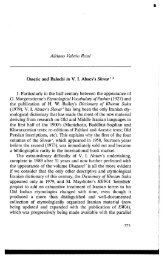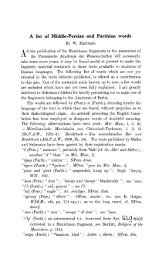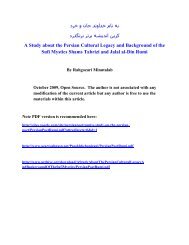Comparative Notes on Hurro-Urartian, Northern Caucasian
Comparative Notes on Hurro-Urartian, Northern Caucasian
Comparative Notes on Hurro-Urartian, Northern Caucasian
Create successful ePaper yourself
Turn your PDF publications into a flip-book with our unique Google optimized e-Paper software.
this god and eaten by the whole family but not by strangers” (cf. the same Eastern<br />
Iranian elements in the reverse order in Sogdian Gwr’rD [*xôr-arE] “the fire of the sun”,<br />
the old Ossetic divine name Xur-at-xur<strong>on</strong> < *xur-art-xur-<strong>on</strong> “Fire, compani<strong>on</strong> of the<br />
Sun” 75 ), and possibly in Scythian Cendartãkh (read instead of the distorted<br />
Ceudartãkh): lÒfow §n Skuy¤& metå tÚ legÒmen<strong>on</strong> ˆrow ëgi<strong>on</strong> (Steph. Byz.) =<br />
*fsand- “holy” + art “fire”. 76 The word is c<strong>on</strong>tinued in the other Eastern Iranian<br />
languages (Khwarazmian ’dr, Bactrian aE(o)Ío “fire”, Sogdian ”tr, Yagnobi ol “fire”,<br />
Afghani or, Pamirian Shugni yôc, Yazgulian yec, Mudzhan yûr, Yidga yûr= 77 ) and in<br />
Western dialects (Kurd âr). The number of Indo-European cognates with the same<br />
suffix 78 is restricted, and although they are closely related semantically, they usually do<br />
not have the primary meaning “fire”. It is comm<strong>on</strong>ly accepted that the word is<br />
c<strong>on</strong>nected to Latin âter “black” (< blackened by fire), âtrium “forecourt, hall” (originally<br />
a place where the smoke from the hearth escaped through a hole in the roof, cf.<br />
Avestan âtrya- “ashes”, Buddhist Sogdian ”Í’kw “ash”, Mudzhan yéxyo “ash”, Sarykol<br />
75 Dumézil 1978, 141-142. According to Dumézil’s interpretati<strong>on</strong> the name in an archaic Ossetic prayer<br />
written down by Gatiev 1876, 21, should be understood as “Sun-Fire, the s<strong>on</strong> of the Sun” (<strong>on</strong> this, cf.<br />
already Miller 1882, 266-267). In Avestan religi<strong>on</strong> Fire is the s<strong>on</strong> of the principal god Ahura Mazda.<br />
The form was borrowed into Slavic as the name of a fiery dem<strong>on</strong> or bird, Czech Rarog, see <strong>on</strong> the<br />
different sound shapes of the word Jakobs<strong>on</strong> 1985, 7, 26-28, 47-52 (with another Iranian etymology).<br />
76 Vasmer 1923, 57; Abaev 1949, 158. Less clear is the interpretati<strong>on</strong> of the name ÉAryãmvn (*âEr<br />
“fire” + â-man- “to teach, to show; to adore” > Ossetic am<strong>on</strong>yn used also in mythological names, cf.<br />
Milewski 1969, 157, <strong>on</strong> the meaning of the Ossetic verb; Abaev 1958, 52-53, and Zgusta 1955, 70, for other<br />
suggesti<strong>on</strong>s).<br />
77 Benveniste 1929, 91; Steblin-Kamenskij 1981, 321; Griunberg 1972, 391; Xromov 1972, 121, 127;<br />
Sokolova 1967, 14, 125; 1973, 9, 48; Edel’man 1986, 172-175.<br />
78 The root is c<strong>on</strong>nected to the Hittite verb ha-/a-/ay-/e-/(w)a- “to be warm, to be hot”, but <strong>on</strong> the<br />
difficulties in rec<strong>on</strong>structing the initial (even synchr<strong>on</strong>ically for the Hittite rhyming formati<strong>on</strong>s) see<br />
Puhvel 1984, 9-12; <strong>on</strong> *Hai-dh- (Old Irish aed “fire”): Sturtevant 1942, 45; Pokorny 1959, 11; Watkins<br />
1985, 1. Theoretically Iranian âtar might have bel<strong>on</strong>ged to the same Eastern Indo-European (Greek-<br />
Maced<strong>on</strong>ian–Iranian) stem as Homeric Greek afiyÆr “the upper air, the purest and most elevated<br />
radiant part of the atmosphere”, Maced<strong>on</strong>ian éd∞: oÈranÒw (Hsch.; with a morph<strong>on</strong>ological loss of<br />
the final *-r, see also as a parallel formati<strong>on</strong> Tocharian B e/iprer, A eprer “atmospheric space”), but<br />
several ph<strong>on</strong>etic irregularities in the corresp<strong>on</strong>dences point to taboo distorti<strong>on</strong>s, quite understandable in<br />
an important sacred term. According to Jasanoff (1979, 145) the Armenian verb ayr-el “to burn”<br />
(previously thought to be related to the Iranian noun) may be a cognate of Greek a‡yv, with the same<br />
meaning.





